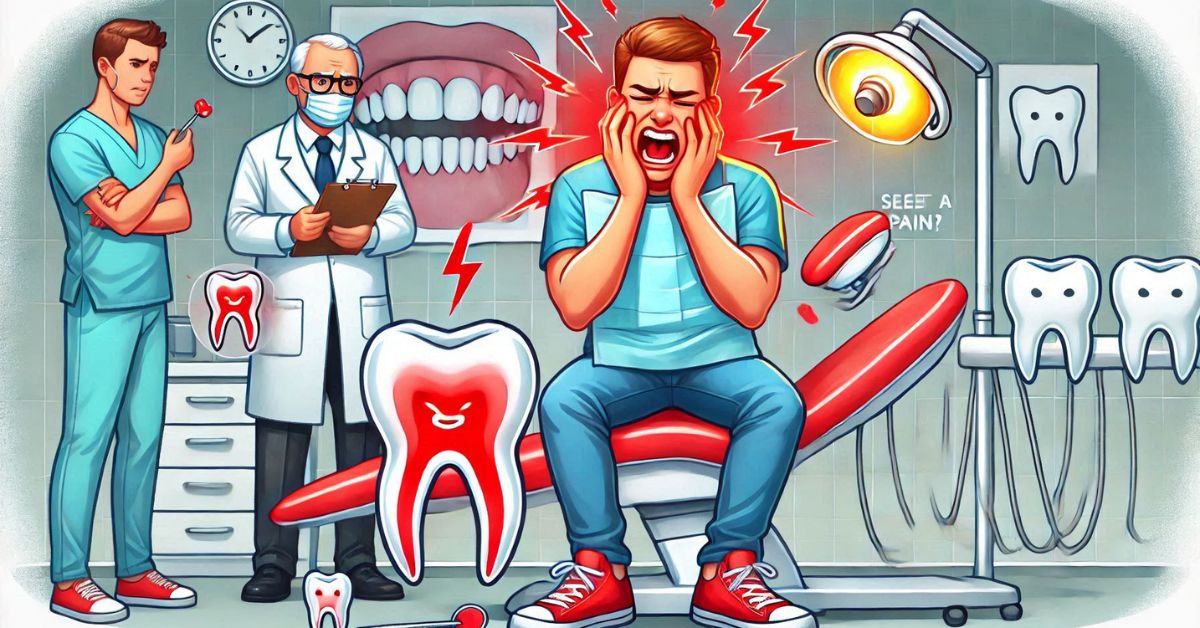Are you dealing with throbbing gum pain? It might be a sign of gum disease. When your gums hurt, it’s important to know when to see a dentist.
Ignoring the pain can make the problem worse. A dentist can help identify the cause and stop the pain. Don’t wait too long-get checked today to protect your smile!
What Is Throbbing Gum Pain?
Throbbing gum pain is a discomfort that pulses in your gums. It can be caused by several factors, like infection or gum disease. The pain may start mild but can get worse over time. Sometimes, it feels like a steady pulse or throbbing sensation. Poor oral hygiene can lead to this type of pain.
If the pain lasts for several days, it could indicate an infection. Swelling and redness may also appear along with the pain. If you notice these signs, it’s important to see a dentist. A dentist can check your gums and find the cause of the pain. Delaying treatment can make the problem worse, so it’s best to act quickly.
Causes of Throbbing Gum Pain
Throbbing gum pain can have many causes. One common cause is gum disease, which can make your gums swollen and painful. A tooth infection or abscess can also cause throbbing pain in the gums. Teeth grinding puts pressure on your gums and can lead to pain. Poor oral hygiene can cause plaque buildup, which irritates the gums. Hormonal changes can make your gums more sensitive and painful.
Vitamin deficiencies, like lack of vitamin C, can also lead to gum pain. Stress can weaken your immune system and make your gums more vulnerable to infection. Gum recession can expose sensitive areas of your teeth, causing pain. If you experience throbbing gum pain, it’s best to see a dentist to find out the cause.
Signs You Need a Dentist
If you have throbbing gum pain, it might be time to see a dentist. Swelling or redness in your gums is a clear sign something is wrong. Bleeding gums when brushing or flossing can also mean you need dental help. If the pain lasts more than a few days, it’s important to get checked.
If you notice pus or an abscess, you should see a dentist right away. Bad breath that doesn’t go away could also be a sign of an infection. If your gums are receding or your teeth feel loose, it’s time for a visit. Sensitivity to hot or cold foods can be another warning sign. When gum pain affects your daily life, don’t ignore it. Seeing a dentist early can help prevent bigger issues later.
Gum Disease and Pain
Stress can contribute to throbbing gum pain. When you’re stressed, you may grind your teeth at night, which can hurt your gums. This grinding puts pressure on your teeth and gums, leading to pain.
Stress also weakens your immune system, making it harder to fight infections. If your gums are already inflamed, stress can make the pain worse. In some cases, untreated gum issues caused by stress can lead to more serious problems like needing a root canal.
If the pain doesn’t go away or keeps getting worse, it’s important to see a dentist. They can check if stress is causing the pain and offer treatments. Ignoring the pain can lead to further damage to your gums and teeth. Early dental care can help you manage stress-related gum pain and prevent more serious issues.
How Gum Infection Starts
Gum infections often start with poor oral hygiene. When you don’t brush or floss regularly, plaque builds up on your teeth. This plaque can irritate your gums and cause them to swell. Over time, the bacteria in plaque can infect your gums. The infection can lead to redness, bleeding, and throbbing pain.
If left untreated, the infection can spread deeper into the gums and even affect your teeth. You may notice that your gums feel sore or tender to the touch. As the infection worsens, you may see pus or experience a bad taste in your mouth. If you notice any of these signs, it’s important to see a dentist right away. A dentist can treat the infection and prevent it from getting worse.
Tooth Decay and Gum Pain
Tooth decay can lead to throbbing gum pain. When a tooth decays, it creates cavities that can infect the surrounding gums. The bacteria from the decay can cause your gums to swell and become painful. This infection can spread to other areas of your mouth, making the pain worse.
If you have a toothache along with gum pain, it could be due to decay. The pain might become more intense when eating or drinking hot or cold foods. Ignoring tooth decay can lead to a more serious infection that may require a root canal.
If you notice gum pain near a decaying tooth, it’s time to see a dentist. The dentist can clean out the decay and treat the infection. Early treatment can prevent further damage to your teeth and gums.
Gingivitis and Its Symptoms
Gingivitis is a common cause of throbbing gum pain. It happens when plaque builds up on your teeth, causing gum irritation. The main symptom of gingivitis is red, swollen gums. You may also notice that your gums bleed when you brush or floss. The pain can range from mild to throbbing, especially when touched.
If left untreated, gingivitis can lead to more serious gum disease. The throbbing pain may worsen if the infection spreads. If you notice any of these symptoms, it’s important to see a dentist. A dentist can diagnose gingivitis and provide treatments to reduce the pain. Treating gingivitis early can prevent it from turning into more severe gum issues.
Periodontitis
Periodontitis is a serious gum disease that can cause throbbing gum pain. It occurs when gingivitis is left untreated, causing deeper gum infection. The gums become swollen, red, and painful. You may notice that your gums start to recede, making your teeth appear longer. In some cases, the pain can become severe and constant. The infection can also cause bad breath that doesn’t go away.
Periodontitis can damage the tissues and bone around your teeth. If you have throbbing gum pain and suspect periodontitis, it’s important to see a dentist. A dentist can assess the damage and recommend treatment. Treating periodontitis early can help prevent tooth loss and further complications.
Abscesses and Throbbing Pain
An abscess is a pocket of infection that can cause throbbing gum pain. It usually forms near a tooth that is infected or decayed. The infection can spread into the surrounding gum tissue, causing swelling and pain. Abscesses are often very painful and can cause your gum to feel hot or tender. You may notice a small, pimple-like bump on your gum near the infected tooth. The pain can get worse if you touch the area or eat certain foods.
An abscess can also cause a bad taste in your mouth or foul-smelling breath. If you have throbbing gum pain and suspect an abscess, it’s important to see a dentist immediately. Left untreated, an abscess can lead to serious complications, like the spread of infection. A dentist can drain the abscess and treat the infection to relieve the pain.
Gum Recession
Gum recession occurs when your gums pull back from your teeth. This exposes more of your tooth or the tooth’s root, which can lead to pain. When the gums recede, the sensitive part of your teeth is exposed, causing throbbing pain. You might also notice your teeth appear longer than usual. Gum recession can be caused by brushing too hard, gum disease, or aging. The exposed areas can easily become irritated and painful.
If you have throbbing gum pain and suspect gum recession, it’s important to see a dentist. A dentist can check the health of your gums and suggest treatment options. If left untreated, gum recession can lead to tooth sensitivity and even tooth loss. Early treatment can help prevent further gum recession and pain.
Stress and Gum Pain
Stress can contribute to throbbing gum pain. When you’re stressed, you may grind your teeth at night, which can hurt your gums. This grinding puts pressure on your teeth and gums, leading to pain. Stress also weakens your immune system, making it harder to fight infections. If your gums are already inflamed, stress can make the pain worse. In some cases, untreated gum issues caused by stress can lead to more serious problems like needing a root canal.
If the pain doesn’t go away or keeps getting worse, it’s important to see a dentist. They can check if stress is causing the pain and offer treatments. Ignoring the pain can lead to further damage to your gums and teeth. Early dental care can help you manage stress-related gum pain and prevent more serious issues.
Grinding Teeth and Pain
Grinding your teeth can lead to throbbing gum pain. It puts pressure on your gums and can cause them to become sore. This pressure can also damage your teeth, leading to cracks or chips. If a tooth becomes infected, it may cause a tooth abscess. The abscess can spread infection to your gums, causing swelling and throbbing pain. Over time, teeth grinding can wear down the enamel, making your gums more sensitive.
If the pain from grinding doesn’t go away, it’s important to see a dentist. A dentist can check for any damage to your teeth or gums. They can also offer solutions like a mouthguard to prevent grinding. Treating the issue early can help relieve pain and prevent further damage.
Hormonal Changes and Gum Health
Hormonal changes can affect your gum health. Changes during pregnancy, menopause, or menstruation can make your gums more sensitive. This can lead to swelling, bleeding, and throbbing gum pain. During pregnancy, increased blood flow can cause gums to become swollen and bleed easily. Menopause can cause a decrease in estrogen, which affects the gums and can lead to discomfort.
If you experience these changes and have throbbing gum pain, it’s important to see a dentist. Hormonal shifts can make gum problems worse, increasing the risk of infection. In some cases, untreated gum issues can require seeking emergency dental treatment. A dentist can check your gum health and recommend treatments to manage the pain. Taking care of your gums during hormonal changes can prevent long-term issues.
Vitamin Deficiency and Pain
A vitamin deficiency can lead to throbbing gum pain. Lack of vitamin C, for example, can cause gums to become swollen and bleed. This condition is known as scurvy and can make your gums feel painful and tender.
If you don’t get enough vitamins, your body has a harder time healing and fighting infections. A vitamin deficiency can also make it easier for gum disease to develop. If your gums hurt and you think it might be due to a lack of vitamins, it’s time to see a dentist.
They can help you figure out if a deficiency is the cause of the pain. The dentist may also suggest changes to your diet or recommend supplements. Ignoring vitamin-related gum pain can make the problem worse. Treating the deficiency early can help reduce the pain and protect your gum health.
Preventing Future Gum Pain
Preventing future gum pain starts with good oral hygiene. Brush your teeth at least twice a day and floss daily. Using a soft-bristled toothbrush can help avoid damaging your gums. Visit your dentist regularly for check-ups and cleanings. Eating a balanced diet rich in vitamins can keep your gums healthy.
Avoid smoking, as it can contribute to gum disease and pain. Drink plenty of water to keep your mouth hydrated and wash away food particles. If you grind your teeth, consider wearing a mouthguard to protect your gums. Pay attention to any signs of gum irritation and see your dentist if the pain starts. Early action can prevent more serious gum problems and keep your smile pain-free.
Learn More About Throbbing Gum Pain
Throbbing gum pain can be a sign of a serious issue. It may be caused by gum disease, infection, or tooth problems. If you experience this pain, it’s important to see a dentist. Ignoring throbbing gum pain can make the problem worse. A dentist can help find the cause and provide the right treatment. Taking care of your gums early can prevent further pain and damage.
Visit our blog for more!



